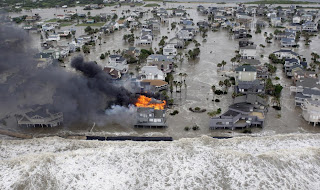


On Feb. 4th, 2010 the First Court of Appeals in Houston, Texas upheld the public's right to use the beach from the waterline to the line of vegetation. As seawater levels rise and hurricane intensity & number increase more beachfront homes are threatened along the Texas Gulf coast. As hurricane surge sweeps away at our beaches, the Gulf of Mexico is claiming many homes. In the state of Texas under the Texas Open Beaches Act, all beach from the waterline to the line of vegetation is open to the public. This is a great thing for beachcombers and surfers alike because they have the right to use any beach. But this could be detrimental for beachfront homeowners. In 2008 Hurricane Ike struck Galveston Island taking with it thousands of homes and pushing the line of vegetation back even further. Many of the houses along the island are now beyond the line of vegetation placing them on public beaches. Under law once this line of vegetation has moved back, any structure, house, or road that sits between the waterline and line of vegetation now belongs to the state and is ordered to be demolished. I am very sympathetic to the loss of property by anyone, and am deeply saddened by the devestation Ike has done to our beaches. But buying beachfront property is a high risk investment and many people are aware of this when purchasing homes along the coast. In Surfside Beach, down the coast from Galveston, they have already seen this problem at hand. In the past 10-15 years, about 20 or so houses have been sitting between the waterline and the vegetation line and is considered to be on public beach. But homeowners still used their houses and didn't seem to pose a problem to beachcombers. In fact the housing provided shade to sit under, and for surfers to use the balconies to check where the surf was breaking. It seemed no nuisance or hazard to the public. Under the Texas Open Beaches Act, the 13 houses that are left (the rest swept from hurricane Ike) along Surfside drive are now scheduled to be demolished along with many other houses along Galveston Island and the rest of the Texas Gulf coast. My question is, do you think that houses sitting on public beach between the waterline and line of vegetation should be demolished or allowed to stay for their owners continued use? I feel that as long as the house is in good condition and not hazardous to the public, I think people should be able to continue to own and use their house. Under the condition that, because it is on public beach, that people have the right to walk near or under the house, I have no problem with the housing being there. What do you think?


I agree with you on this Hugh. I think that like any property on public land, the owner should have rights to the structure, and surrounding land if purchased, as long as they are not interfering with the wildlife etc. As long as the house is to code and determined to be in safe, habitable condition, there should be no reason for it to be demolished.
ReplyDeleteI definitely agree! As much as beachfront property comes with its risks, accelerated erosion is not necessarily an expected risk. It sounds like as long as the homeowners continue having a good relationship with the public and houses are kept up to code, demolition should not be the alternative.
ReplyDeleteI find this to be a tricky problem. The people who build these houses should know the risks involved with building a house in a potentially dangerous area. If I was a homeowner whose house happened to fall into the problem you have described, I do not think I would want people hanging out around my house who I do not know. It seems like your property would turn into a hang out area for others to enjoy.
ReplyDeleteI am going to agree with the state and say that if the shoreline and vegetation line changes, then any house in the new area should be demolished. Under the law it is now public land, so it would make sense to make the entire piece of land accessible to the public. This would encourage people to think twice about building beachfront houses.
I agree Hugh the owner should be entitled to his property. Certain things like the erosion cannot be predicted it is unfair for the homeowner to have to demolish his because of an unseen problem.
ReplyDeleteI agree that the owner should be entitled to his property, but how are these people allowed to build along these shores in the first place? I think that people often overlook the dangers of building houses in flood/hurricane/tornado prone areas. We watch houses fall into the ocean on TV, and all I can do is laugh at the stupidity of bulding a house on a loose dirt bluff 200 feet above the ocean. It makes me wonder how these people get house insurance... and if the insurance companies aren't bailing them out, are tax payers?
ReplyDeleteI agree, the homeowner should definitely be entitled to his property. Like the homeowners, the state should realize the risks that follow buying a house on the beach. I basically grew up on a beach in SC and saw the shoreline decreasing as I grew older. I would find it outrageous if those homeowners were told that their house was going to be destroyed. If you have a beachfront house, you have to understand that people are going to be frequenting your area during the summer months also.
ReplyDeleteThis is terrible for the property owners. I understand that the state is left with little choice due to extenuating circumstances, however, there has to be something that can be done so that all of these people are not forced to completely start over. It seems to me that there has to be another option. I agree with your sympathy for the home owners. I also feel as though doing things like this will only increase feelings of disdain for the government.
ReplyDeleteI am from San Diego and I have often wondered what people who buy houses on the very edge of cliffs are thinking. Do they really think the edge of the cliff was always there? Do they think these are some special cliffs which are not susceptiable to natural erosion? When buying beach front property, the owners know the risks and I think it should be up to the individuals in Florida whether they want to keep their houses or move. As long as it isn't disrupting the community and beach activites, such as lifeguards trying to drive along the beach, then I don't see why it should be a problem. Perhaps the next house they purchase should be in an area with little sturdier foundation.
ReplyDelete